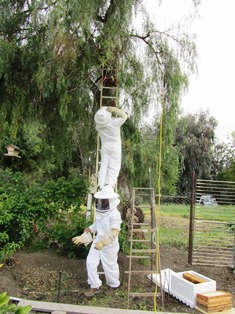A Swarm in July Isn’t Worth a Fly
There’s an old proverb about bees that goes: A swarm in May is worth a load of hay, a swarm in June is worth a silver spoon, but a swarm in July isn’t worth a fly. You might wonder why.
Well, I asked my beekeeper neighbor that question this morning as we suited up to feed the bees and take some frames of honey. The hives were thriving, bees were active, and the honey production copious. He harvested some, but also left some for the babies that the queen had produced.
There are spring flowers in May and new flowers in June, but by July many of the flowers that the bees love to forage on have flowered and gone to seed. If the queen lays lots of babies, where will the worker bees get enough pollen and nectar to support the entire hive, feed the queen, and supply the babies?
During fall in Northern California, the bees can forage on the eucalyptus blossoms, but then, they must survive through winter. I see bees on my December roses, but there aren’t a lot of flowers blooming in December that have high pollen and nectar loved by the bees.
Swarming in May and June is a sight to behold. Swarming is way the bees of deal with hive/nest overcrowding. It is how they increase their populations. See, http://entomology.unl.edu/beekpg/beeswarm.shtml.
A savvy beekeeper is ready to capture swarms as soon as the weather warms up in late spring. The bees won’t wait, although it is possible for a seasoned beekeeper to anticipate a swarm and take action to avert it. But it doesn’t always work.
An apiarist must manage his or her colony of hives and anticipate the needs and activities of the bees for the coming season–at this time of year, that means during fall and winter. Without a lot of food growing to support a new hive of bees from a captured swarm, a swarm in July isn’t worth a fly.
 Facebook
Facebook Goodreads
Goodreads LinkedIn
LinkedIn Meera Lester
Meera Lester Twitter
Twitter


